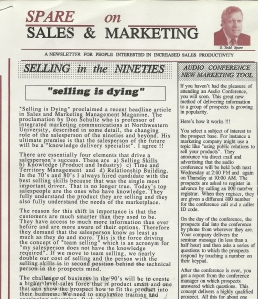There is an interesting debate going on in the sales industry blogosphere about whether selling is dying. What we are really discussing however is “will we need salespeople in the future and what will their role be”.
I used to publish a quarterly newsletter (Spare on Sales and Marketing) back in the early nineties… I was recently doing research for an article I am writing and came across the newsletter published in July 1993 in which my lead story was “Selling is Dying”.

From the Article…
There are essentially four elements that drive a salesperson’s success. These are a.) Selling Skills, b.) Knowledge (Product and Industry), c.) Time and Territory Management, and d.) Relationship Building. I used to hire salespeople based on their selling skills because that was the most important driver. That is no longer true. Today’s top salespeople are the ones who have knowledge. They fully understand the product or service they are selling. They fully understand the needs of the prospect and the marketplace.
The closing line in my article back then was “for selling in the nineties (1990’s) the name of the game is how do we deliver the most knowledge (added value) to our customer.”….
According to Selling Power Magazine, Gartner Research analyzed the market and projected that we will downsize from twenty million salespeople today to four million by 2020. This projection is based on industry trends and the growing sophistication of software applications (to deliver knowledge) and the continuing acceleration of computer power and social media.
At a Sales2.0 conference in 2010, Gerhard Gschwandtner, publisher of Selling Power asked the audience to raise their hand if they have ever purchased anything from Amazon.com. Almost everyone raised their hand. Then he asked “How many of you have ever spoken to an Amazon salesperson?” Nobody raised their hand. The exercise demonstrates that a lot of products are being sold through automation.
I believe at some product levels, we don’t necessarily need outbound sales personnel, but at higher levels, we will always need them.
As technology improves, more and more products will be sold automatically in the Business to Business (B2B) arena. It’s already happening in many acquisition areas like office supplies and some forms of printing, computer purchases, etc. Many state governments and large corporations have initiated on line requisitioning where an RFQ is published and the best respondent (best price, highest quality) can win the bid and the buyer and seller never talk face to face.
So who will need the four million salespeople that are left? Many of them may be situated in call centers rather than outside sales positions. The balance will be working for companies where the buyer cannot capture the knowledge or comfort required to make a good buying decision.
There are a number of industries where the customer will need additional help in his research and decision making process and there will always be a role for the salesperson in these situations. The role may become that of the differentiator or negotiator.
Industries where you are selling professional services or highly technical products will always need salespeople. Often in these industries there is a technical consultant available to assist the salesperson and the customer in understanding what he is investing in.
So, ultimately, we are really discussing the question of “what’s the value the salesperson brings” I believe the salesperson’s task at hand is to be become much more informed about the prospect’s business and industry and their strategies. Then the salesperson needs a full understanding of the potential his product or service offers to assist those strategies.
To some extent very complex (highly engineered) products will require salespeople as well. I don’t see countries and companies buying Boeing aircraft on the web in the near future.
So the salesperson of the future will need to be a “knowledge broker” more than anything else.
The competencies (drivers) required for this position will include:
Knowledge of
—General business
—The Prospect’s business
—The industry
—The competition
Questioning and Listening Skills
Strategic Thinking
Conviction, Confidence and Integrity
So, perhaps selling (as we once knew it) is dying.
If a salesperson wants to be one of the remaining four million, he/she will need to grow the above skills, work continually to increase their education and begin looking for sales opportunities with companies whose products are complex and hard to sell.
Thoughtfully yours
Todd


